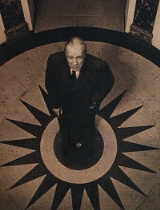
. In 1914 his family moved to Switzerland
where he attended school, receiving his baccalauréat from the Collège de Genève in 1918. The family travelled widely in Europe, including stays in Spain
. On his return to Argentina in 1921, Borges began publishing his poems and essays in surrealist literary journals.
If the pages of this book contain some successful verse, the reader must excuse me the discourtesy of having usurped it first. Our nothingness differs little; it is a trivial and chance circumstance that you should be the reader of these exercises and I their author.![]()
That one individual should awaken in another memories that belong to still a third is an obvious paradox.![]()
Reading ... is an activity subsequent to writing: more resigned, more civil, more intellectual.![]()
Mir Bahadur Ali is, as we have seen, incapable of evading the most vulgar of art's temptations: that of being a genius.![]()
The universe (which others call the Library) is composed of an indefinite and perhaps infinite number of hexagonal galleries, with vast air shafts between, surrounded by very low railings.![]()

